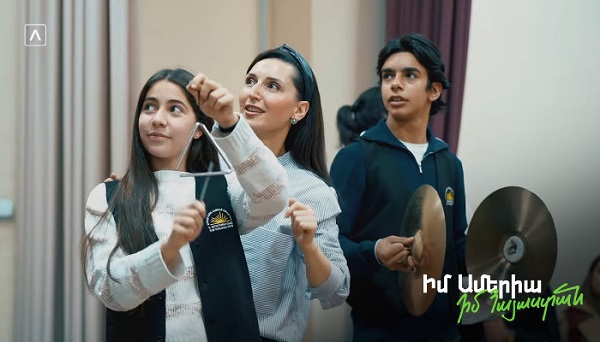Teens, who came to Armenia from Iraq, Syria and Karabakh, are trying jointly to overcome a stressful experience
...
The eyes of 15-year-old Eric clearly reflect all that grief that has accumulated in the recent years. The memories of the hostilities in his native village are still fresh in his mind. He could hardly hide an irresistible desire to return to Talish, where he spent his childhood and where he still sees his future.
“Shooting had been always a commonplace in our village and we were no longer afraid. But it was really awful that day. We were woken up by the sounds of shots, we went down to the basement and stayed there until 3 a.m.. Then we came out and went to the village administration building. The villagers were evacuated on cars from that place. When in the basement, I thought it was the end... But if our security is ensured, we will be the first to return to the village,” says Eric Sargsyan.

He is from Talish village, located in the southeastern part of Nagorno-Karabakh. His family now lives in Charentsavan town, Armenia.
Talish residents (500 people) were evacuated following the large-scale hostilities, waged by the Azerbaijani armed forces on April 2 this year. They were settled in various cities of Karabakh and Armenia.
David Petrosyan, 14, is also from Talish. Like many others, his family was also taken to Charentsavan. The only thing he remembers from the April 2 nightmare is how hard he pressed his hands over his ears to muffle the ‘sounds of war’.
"I had many friends there, but now we’ve all found ourselves in different places: Charentsavan, Hrazdan, Abovyan ... We miss each other, but it can’t be helped. That night I was sure, everything would be fine, that we would survive. Now we are here, making new friends. Everybody here has gone through the war, and that’s exactly what unites us somehow,” says David, tightly hugging his brother Vahe.

8 teens from Talish spent the last days of summer together with other 32 youngsters, who had earlier moved to Armenia from from Iraq and Syria, in Aramyan camp of the Young Men’s Christian Association (YMCA), in Vanadzor, 150 km away from Yerevan.
According to Siranush Vardanyan, the head of the Save the Children’s program to assist the Syrian Armenians, the project that is underway in YMCA’s Aramyan camp serves the single goal: to relieve the stress in children, who, at different times, have experienced the horrors of war. In his words, the YMCA camp provides the best conditions for that. It has become possible to implement the program through the funding provided by the Office of the UN High Commissioner for Refugees.
“Regrettably, we have children, young people, who have experienced the war. The mines and bombs were exploding right in front of their eyes. They witnessed all that, but here they try to get out of this stress. Our volunteer youth leaders are the Armenians from Iraq and Syria, who themselves immigrated to Armenia some time ago. They have gone through the same path that these guys, who are a little bit younger than they are, are taking now,” says Siranush Vardanyan.

Each of the youth leaders has 4 supervisees. The camp participants' age ranges from 12 to 17. They spend 12 days in the camp. There is no Internet in the YMCA Aramyan camp and the children don’t use the mobile phones either. It’s neither a misstep, nor an accidental thing, but rather an individual approach to the psychological rehabilitation process.
Anahit Hayrapetyan, the External Relations Coordinator at the Office of the United Nations High Commissioner for Refugees (UNHCR Armenia), notes:
“Eeveryone here has his/her own role and responsibility. You could hear the Western Armenian [spoken by the foreigner Armenians], as well as the Eastern Armenian [it is spoken in Armenia]. There are guys in this group, who have just recently moved to Armenia. There are also those, who've been here for quite a long time already. And all of them have their soul wounds: some of them have deeper ones, others have them more or less healed. Some of them have already passed this way, and all of them understand each other,” says Hayrapetyan.

Nanor Abelyan, 14, moved to Armenia from Aleppo two years ago. She admits, she doesn’t want to return home. It seems to her that people in the camp have long known each other:
“I don’t feel any difference between us. Simply the Armenians from Talish speak slightly differently. We are all Armenians. What unites us is that all of us have experienced the war- the Iraqi Armenians went through it a little bit earlier, then we and now the Talish natives. But here we don’t even talk about it. It’s like a dream for me. And this is our homeland.”
The youth leaders work with groups in the daytime: some of them dance or singe, other groups hold discussions about friendship, peace and integrity, get familiar with the leadership fundamentals.

Shant Sargis Avadis, 20, moved to Armenia from Iraq a decade ago. He is one of the volunteers at the Office of UN High Commissioner for Refugees. In each Talish teenager he could recognize himself some 10 years ago:
“We’ve gone through it ourselves and now we are trying to shake those memories out of them. I could see myself in their looks. Simply, what I had to witness was unimaginable: exploding cars; human heads and legs flying in the air...My mother was killed there. I came to Armenia together with my father and my sister. It's a great responsibility for us, the leaders. What the camp gives us are new friends, new people with their own stories and a new character.”
The camp is secludedly hidden in the dense forests, typical of Lori region. The days begin with meeting the sunrise and end with conversations around the campfires.

Nubar Nalbandian, 20, a youth leader, is also from Aleppo: “At night we have some kind of psychological talk about trust and responsibility, we listen to their opinions. We don’t talk about the war, but we work towards helping them overcome a post-war period.”

Mariam Sargsyan, a consulting psychologist at the UN Children's Fund, also works with these young people. She notes that the guys from Talish are still experiencing a post-war trauma. The Syrian youth, who have been living in Yerevan for several years, already have some sense of security, but they, in turn, have been facing some other challenges, commonly referred to as the post-migration adaptation problems.
“The Iraqi youth are already mature and they are staying here in the capacity of the youth leaders. It is noteworthy that have assumed the role that implies certain responsibility at this very stage of their life. When you are responsible for helping others, a mechanism of inner power starts functioning, which is a perfect opportunity for them to test their capacity limits and unlock their potential. There are the youth leaders, who can become an ideal ‘I’ model for the younger ones,” says the psychologist.
Even the cuisine here has been well thought-out in order to make everyone enjoy it. Karine Boyadjan, the camp director, says a menu has been composed so as to make everyone happy:
“I was a little bit worried about the guys from Talish. I thought, they might not like it, but I could say that the Syrian cuisine has caught everybody’s fancy.”

The program officials believe, the existing cultural differences will be beneficial for everyone.
Mariam Sargsyan, a psychologist, notes: all of them could feel that they went through the same path, experienced the same shock, and some of them have already overcome all their troubles:
“They already can draw certain conclusions with regard to their life; they could be inspired and create their own vision of the future. And the more diverse the visions of the future are, the more alternative variants there are, the more flexible they become and can better get adapted. In this context, the exchange of experience will have a positive effect on them.”











